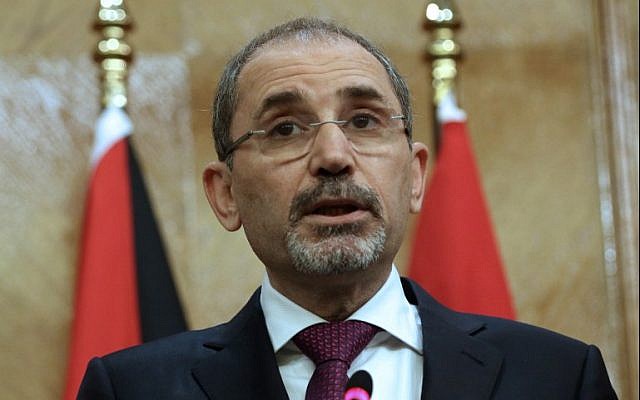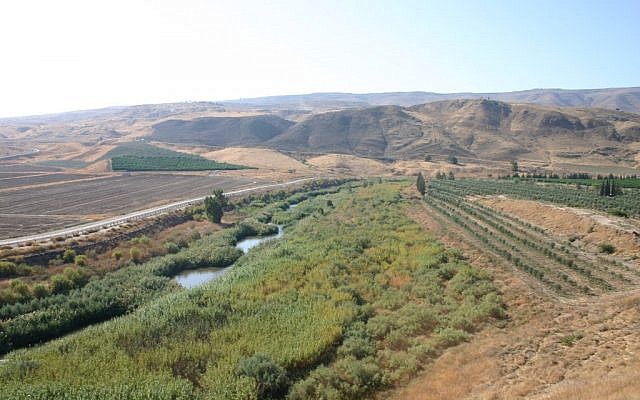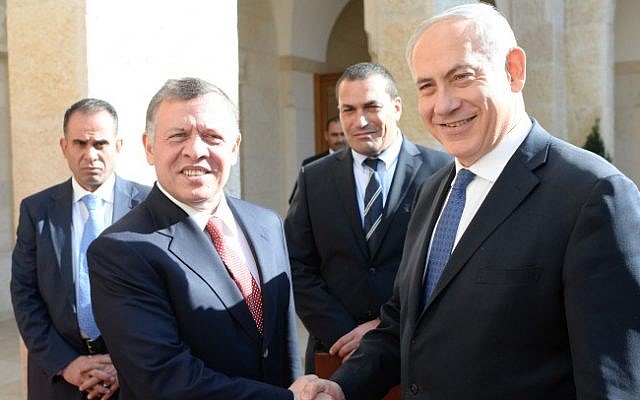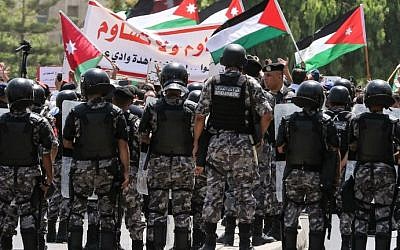Ayman Safadi dismisses Netanyahu’s promise to renegotiate after king says he won’t renew annexes to 1994 treaty, insists ‘only question will be how we cancel these leased areas’

Jordan will not negotiate with Israel to renew part of the 1994 peace treaty that granted the Jewish state use of two small agricultural areas along the border, Jordanian Foreign Minister Ayman Safadi said Monday night, dashing hopes in Jerusalem that Amman could be convinced to reverse course.
Speaking to a local Jordanian news channel, Safadi insisted that the Hashemite kingdom would not renege on King Abdullah II’s promise to take back control of the areas that Israel has been allowed to lease for the past 25 years.
“We will not negotiate over the sovereignty of these areas,” Safadi said of Naharayim in the north and the Tzofar enclave in the southern Arava desert.
Abdullah said on Sunday that the areas would return to Jordanian hands when their leases expire next year. The lands in question were ceded to Jordan as part of the countries’ 1994 peace treaty, but Amman agreed Israeli farmers could still access and work the plots as part of a 25-year-lease that had been widely expected in Israel to be renewed.

Responding to Abdullah, Prime Minister Benjamin Netanyahu said Sunday that Israel “will enter into negotiations with Jordan to extend the existing agreement,” which is automatically renewable unless either side gives a year’s notice to terminate the deal.
But Safadi said Israel had made no effort to enter such negotiations, and even if it did, Jordan would not budge.
“We have so far not received any official request to open talks,” he said, “but if we do open talks, the only question will be how we cancel these leased areas.”
The move is widely seen as a result of pressure from Jordanian hardliners. In recent months, Amman has faced intense calls to cancel the lease agreement, with several mass demonstrations urging the government to “reassert Jordanian sovereignty” over the area. The pressure was increased when 80 lawmakers signed a letter to the government urging the cancellation.
On Sunday, Jordanian parliament members praised the move, with Saleh al-Armouti, a regular critic of the king, hailing the decision as “a positive step that restores dignity to the Jordanian citizen and sovereignty over his land.”

Abdullah may also have been keen to distance himself from close ties to Israel, amid tense relations between the Palestinian Authority and the US administration, seeking to clearly place himself on the side of the Palestinians.
Israel and Jordan were embroiled last year in a diplomatic standoff following the shooting deaths of two Jordanians in July 2017 by an Israeli security guard, Ziv Moyal, who Israel said opened fire in self-defense after one of the men tried to stab him.

Israel and Jordan reached an agreement to end the diplomatic fight in January, when a Jordanian government spokesperson said he had received from Israel an “official memorandum” apologizing for the deaths of the two Jordanians, as well as for the killing of a Jordanian judge in a separate incident in 2014.
Earlier this month Jordan’s newly appointed ambassador to Israel, Ghassan Majali, arrived in the country and presented his credentials at the Foreign Ministry, taking a step toward restoring ties between the shaky allies.
Naharayim includes within its boundaries the Isle of Peace tourist spot, a man-made island and hydroelectric power plant at the confluence of the Jordan River and the Yarmouk River.
In 1997, a group of seventh and eighth graders from a Beit Shemesh girls school were on a field trip to the island when a Jordanian soldier opened fire on them, killing seven and injuring six. The shooter, Ahmed Daqamseh, was apprehended by other Jordanian soldiers.
A Jordanian court later deemed Daqamseh mentally unstable and sentenced him to life in prison. He was released after nearly 20 years in prison and is considered a hero by many in Jordan.
As reported by The Times of Israel
